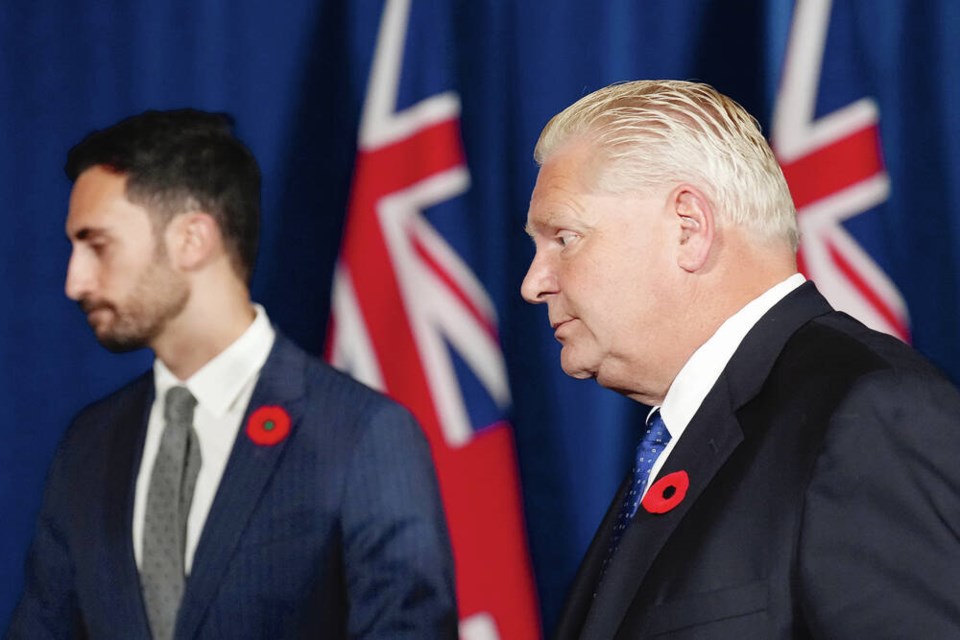Any time the words “public school system” and “trans” anything are used in the same sentence these days, there’s a good chance raucous protest groups will show up at a school board meeting.
That wasn’t the case, however, when Premier Doug Ford’s government embarked on what it called a “transformation” of Ontario’s school system that includes a “getting back to the basics of education” agenda and giving the education minister more power.
Every second communication from Education Minister Stephen Lecce speaks of “transformational learning” and “transformational” leadership.
Schools, Lecce said in April, “need to be emphasizing and focusing on strengthening skills that matter to parents.”
“The goal here today is to send a signal to school boards to refocus their energies on what matters most, which is improving reading, writing and math skills and STEM [science, technology, engineering and math] education.”
Lecce, 36, has a Bachelor of Arts in political science and worked in then-prime minister Stephen Harper’s office after graduation, eventually serving as director of media relations. He was elected as a Progressive Conservative in Ontario in 2018 and became parliamentary assistant to the minister of Infrastructure and subsequently parliamentary assistant to Ford.
On June 20, 2019, he was sworn in as Ontario’s minister of education.
What this adds up to is that Lecce has never actually held a job anywhere in the public education system, which, according to him, is now in need of a “transformational” overhaul.
In the short time he has been in charge of the Ontario Ministry of Education, Lecce authored the Better Schools and Student Outcomes Act, 2023, which he says “is sending a clear signal to school boards that academic achievement is the priority.”
The overhauled language curriculum in English and French includes the introduction of phonics to support reading, and cursive writing.
This at a time when, according to a recent editorial in Maclean’s, several of Canada’s top thinkers are struggling with 21st-century issues such as what it will mean to live in the AI-powered world today’s kids will be moving into — with the ability to write cursively or not.
Reaction was not long in coming. On June 8, 2023, the Elementary Teachers’ Association of Ontario issued a statement saying that, “despite strong opposition from education stakeholders, the Ontario government pushed through legislation that sets public education back decades, undermines student outcomes, diminishes accountability and transparency, and lays the groundwork for further privatization of public education.”
Karen Littlewood, president of the Ontario Secondary School Teachers Federation, said the proposed legislation seemed primarily focused on how school boards operate, and “not on how we can better support students and make up for the learning loss experienced during the pandemic.”
Ontario’s largest school board, the Toronto District School Board, also strenuously voiced its concerns about several aspects of Bill 98, saying it will weaken the role of school trustees. A major concern is that the legislation indicates the ministry would have the ability to override local priorities in the board’s multi-year plans.
Other concerns include the ministry’s new ability to assign “support personnel” to the boards, changes to the role of the integrity commissioner, and new powers for the minister to set provincial priorities for student achievement and require school boards to report publicly on how they’re doing.
What happens to boards that don’t meet the achievement targets? Lecce referred to his existing powers to hold school boards accountable, including the ability to dissolve boards and appoint a provincial supervisor in place of trustees.
Many observers point out that Lecce’s “back to the basics” appeal to parents is a purely political gambit that ignores the results of recent Canada-wide and international tests and is based on a manufactured perception that Ontario schools are doing poorly at teaching math and literacy.
While Lecce talks about scores on provincial standardized tests, Ontario educators point to international test results as evidence that Ontario has one of the best systems in the world, outperforming all other G7 countries on reading and beating all G7 countries except Japan in math and science.
A November 2022 Fraser Institute blog outlines two sources of comparative performance data: PCAP, the Pan-Canadian Assessment Program, which tests random samples of Grade 8 students in each province; and PISA, the OECD’s Program of International Student Assessment, which tests random samples of 15-year-old students from around the world.
Both tests give the highest average reading and science scores to Ontario and Alberta.
Which raises questions about where Ontario’s public education system is heading under Ford and Lecce. Stay tuned.
Geoff Johnson is a former superintendent of schools.
>>> To comment on this article, write a letter to the editor: [email protected]



